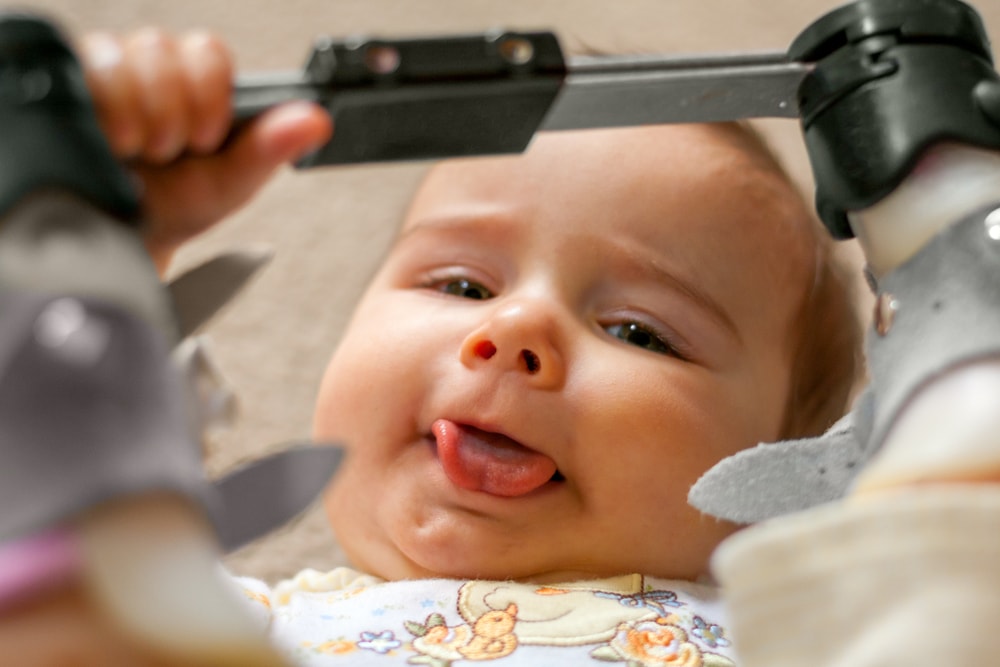Parents sometimes don’t realise their little one is struggling to eat and speak because of a tongue-tie that restricts oral movement. What if this doesn’t resolve itself as the baby grows? Surgery can fix the problem and prevent the child from developing self-esteem issues later in life.
Mason Motz could only speak a few words at age five, even with speech therapy.
He also struggled to eat and swallow, which his parents put down to his diagnosis of Sotos syndrome.
However, they were surprised when they took him to a dentist to get his cavities removed.
Dr. Amy Luedemann-Lazar noticed something that many experts had missed. Mason had a tongue-tie that limited his tongue movement.
Mason was not nonverbal; he was just unable to speak. He had been in speech therapy for years and no one had ever checked under his tongue,
she told Inside Edition.
This discovery has been life changing for the Motz family.
Mason was talking 12 hours after his tongue-tie was released with a non-invasive laser treatment.
There were other incredible changes too:
It’s like night and day. He doesn’t have choking episodes anymore; he’s eating different types of food,” his mother said.
He’s behaving much better at school. His behavior was a problem, because he was getting poor quality of sleep at night, he was constantly tired and was not able to express himself. He doesn’t snore anymore. He doesn’t have sleep apnea anymore.” Meredith Motz
This one small discovery is helping Mason to thrive.
Our article explores:
- What is tongue-tie in babies and children? (ankyloglossia definition)
- Can tongue-tie affect speech and cause other complications?
- Is my baby tongue tied? Ankyloglossia symptoms in children
- Tongue-tie treatment options
- What is the risk of tongue-tie surgery?
What is tongue-tie in babies and children? Ankyloglossia definition
A tongue-tied baby is born with a short lingual frenulum that stops their tongue from moving freely.
For most of us, this thin strip of tissue separates from the tongue before birth, allowing free movement.
However, this split doesn’t occur properly for around four to 11 per cent of newborns.
Doctors don’t know why.
But it seems there could be a hereditary link, if a 2012 study by Korean researchers is anything to go by. We also know that boys are more likely to be affected than girls.
The medical term for tongue-tied is ankyloglossia.
A real mouthful, which is somehow apt, considering that many tongue-tied children struggle with their speech. They may also find it harder to eat and swallow, depending on the severity of their condition.
Having said this, there are varying degrees of ankyloglossia and others have no problems at all.
In some cases, the frenulum loosens during early childhood. This frees the tongue and gets rid of any discomfort being experienced.
When this doesn’t occur, a surgical procedure might be required to release the tongue.
Complications that tongue-tied babies and children may face
Tongue-tied babies:
- Speech difficulties arising from a limited range of motion, especially when it comes to making “t,” “d,” “z,” “s,” “th,” “r” and “l” sounds.
- Problems latching during breastfeeding, which causes pain for the mother.
- Difficulty putting on weight and getting enough nourishment, due to feeding issues.
- Feeling unsettled
- Sleep deprivation
- Failure to thrive
- Frequently hungry
- Colic, wind or hiccups when bottle feeding, due to a poor seal around the bottle teat.
Young children:
- Low self-esteem resulting from speech difficulties
- Poor oral hygiene because a tongue-tie can make cleaning difficult
- Choking, gagging or vomiting because it’s difficult to chew solid foods
- Dribbling and feeling embarrassed as a result
- Falling behind in school
- Behavioural problems stemming from frustration over communication challenges
Keep in mind:
Other medical conditions may cause these conditions, so it’s best to check with your doctor if you have any concerns.
Is my baby tongue-tied? Ankyloglossia symptoms in children
Here are some signs that a tongue-tied baby or child may exhibit:
- Unable to poke their tongue past their lips, or touch the roof of their mouth
- Difficulties moving the tongue sideways to the corners of the mouth
- A flat or square tongue tip, instead of pointy
- Heart-shaped, V shaped, blunt, forked or notched tongue with an indent in the midline
- A gap between the front teeth in the lower jaw
- Difficulties latching during breastfeeding
- Excess saliva production
- Clicking sound when feeding
- Fussiness during meal times
- Colic
- Slow weight gain
- No weight gain
- Gagging on food, especially fruit, vegetables and meat
- Speech problems
- Mouth breathing
- A tongue that looks too large for the mouth (as the baby grows)
- Cavities that emerge, despite healthy eating
- Difficulties falling asleep
Anterior tongue-ties are located near the gum line, so they’re easier to identify. Posterior tongue-ties, on the other hand, are not as visible because they exist deeper in the mouth.
Please note:
Don’t take the absence of obvious symptoms as a sign that your child doesn’t have a tongue tie. It’s possible, for example, to have this condition and still be able to stretch your tongue beyond the lips.
Tongue-ties are diagnosed by doctors after a physical examination that also explores the mother and baby’s medical history.
Dentists can identify tongue-ties and refer the case to a specialist.
Tongue-tie treatment options
There are two approaches to dealing with this condition.
Many parents prefer to wait and see if the tongue-tie will loosen as the baby grows. This works well for children who don’t experience complications.
However, surgery may be required for tongue-tied babies who are struggling to thrive.
Here are the surgical options:
-
- Frenectomy: This is the preferred option for frenulums that are easy to clip, with either scissors or laser. There’s minimum pain and bleeding. Babies can usually resume breastfeeding straight away.
-
- Frenuloplasty: Sometimes the tongue-tie is too severe to be clipped quickly. This approach requires surgical tools, general anaesthesia and stitches (if laser isn’t used).
There’s actually been a surge in the number of babies having frenotomy surgery in recent years. A 10-year review of Medicare data shows a 420 per cent jump from 2006 to 2016.
This is a controversial area, because experts disagree on what the best approach is.
Some prefer to fix the tongue-tie using surgical procedures.
Melbourne dentist Jeff Kestenberg says he sees “wonderful results” when he treats hundreds of babies a year. He told SBS there’s plenty of evidence to support the benefits, even though it’s not yet peer reviewed.
“There’s over 500 articles in the medical and dental literature about treating tongue tie.” Dr Kestenberg
Others are more inclined to adopt the “wait and see” approach.
Dr Vishal Kapoor from the University of Queensland says only a small proportion of infants with significant tongue tie are likely to benefit from the surgery.
“There is very limited research about tongue tie surgery with low quality evidence regarding benefits in newborns,”
Dr Vishal Kapoor, lecturer in Children’s Health at The University of Queensland
Parents who want the best for their tongue-tied baby may feel overwhelmed by the conflicting information. There’s no black and white answer, each individual case is unique. Speak to your doctor, get as much information as you can and weigh up the risks and benefits.
Possible tongue-tie surgery side effects
There’s a risk of complications with any surgical procedure, especially if it’s invasive.
However this is rare.
“There have been reports of significant bleeding with tongue tie surgeries, so the tongue tie surgery is not entirely without risks although the major side effects are uncommon.” Dr Vishal Kapoor, lecturer in Children’s Health at The University of Queensland
Possible complications:
- Vessel or nerve damage
- Heavy bleeding
- The lingual frenum could return after time, which requires another surgery to correct it
- Scarring
- Allergic reaction to anaesthesia
Please discuss any concerns you have with your dentist or doctor.
Mona Vale Dental specialises in children’s dentistry
Our staff are experienced at identifying tongue-ties in babies, children and adults.
What happens if we discover that your child has ankyloglossia? We can refer them to a specialist paediatric dentist who will discuss your options with you.
Please contact us on (02) 9997 1100 if you’d like to book an appointment.
If you can’t get to your dentist or doctor, here are some resources that may be useful in the meantime:
- Australian Breastfeeding Association: 1800 686 268 (24 hours)
- Maternal and child health line: 13 22 29 (24 hours)
- Women’s Health Information Centre: 03 8345 3045 or 1800 442 007 (rural)









